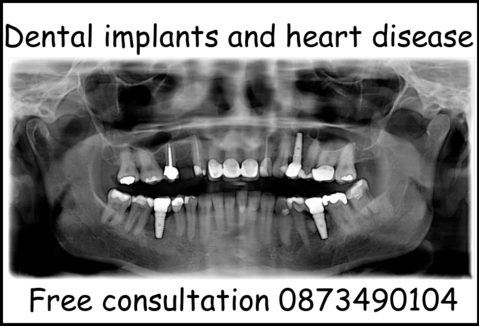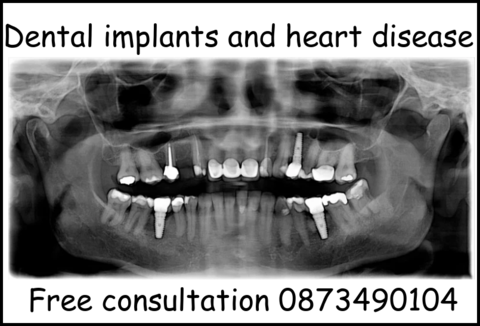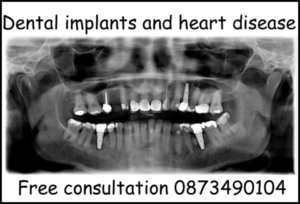Dental implants and heart disease
Can dental implants and heart disease exist in perfect harmony.? This article will take a detailed look at heart disease and whether or not patients with heart disease are suitable for dental implants.
Throughout Ireland missing teeth is one of the most common issues that we at Hungarian Dentists Wexford come across regularly.
I’m sure that you know dental implants are by far the most suitable and popular option favoured by dentists to replace missing teeth.
Not only do dental implants improve the patients self esteem, they also improve oral health, they improve digestion, in addition they reduce any further risk of gum disease and tooth decay.

Heart disease dental implants
By and large dental implants are quite a safe procedure, however if you have heart issues there are a couple of things that you should know about.
The dental implant procedure is invasive, a dental surgeon completes the treatment, here are a few facts about dental implants and heart disease.
If you have heart disease more than likely you will have been to visit a cardiologist. You should make an appointment with him, ask him to a out dental implants and whether or not it is safe for you to proceed.
The biggest risk involves infection, he may want to prescribe a certain type of antibiotic to reduce the risk of an infection.
There is a certain type of infection that occurs in a small amount of patients with heart disease getting dental implants, it is called bacterial endocarditis.
Dental implants and infection
The bacterial endocarditis infection occurs at any time as the open wound in the mouth bleeds allowing bacteria into the bloodstream.
Your cardiologist will be aware of the risk and should prescribe the correct type of antibiotic.
Side effects from the anaesthetic
There is also the risk of side effects from the anaesthetic, a local anaesthetic is used prior to the dental implant treatment.
The local anesthesia normally contains epinephrine to allow for constriction of the blood vessels, the reason for this is to prevent the blood from flushing the anaesthetic away.
Patients with heart disease may be at a higher risk because the restriction in blood flow may increase the heart rate and elevate blood pressure.
Having said that, the risks are relatively low, most patients experience minor ir no side effects at all.
Risks that may never happen
Even though there are risks, this doesn’t mean that they will happen, it’s just better that you are aware of the risks.
Discuss these with your cardiologist, he can put your mind at ease.
Do dental implants create heart disease
A study published in 2020 revealed that a number of study participants believed that certain dental treatments like dental implants and tooth extractions can increase the likelihood of a heart attack.
The reasoning behind these findings was because of the surgical nature of the procedure it increases inflammation in the body.
The fact is even though there is minimal risk it’s highly unlikely that dental implant surgery will cause heart disease particularly in clinics with modern technology.

Steps to ensure that dental implants are safe for patients with heart disease.
First and foremost you want to work with an experienced dentist that has all the required knowledge about dental implants and heart disease.
Our experienced Hungarian dentists in Wexford are available to discuss your treatment, how long it will take, are there any risks and how much it is going to cost.
Fintan is your Irish local coordinator for Hungarian dentists Wexford and Perfect Smile Dental Implant Centre Hungary.
Fintans phone number is 0873490104, give him a call to arrange a consultation with our friendly Hungarian dentists in Wexford.
Hungarian Dentists Wexford will ask you to first fill out a health questionnaire, be truthful, add all the relevant information on your health, include all medications.
Two types of dental implants
In terms of invasiveness there is a choice of two types of dental implants, one is endosteal implants and the other is subperiosteal.
The main difference between the two is the subperiosteal implants are fixed on top of the jawbone instead of them being implanted deep into the jawbone.
The subperiosteal implants require less invasive surgery and require less recovery time.
The other option is is a flapless treatment involving the endosteal implants, this means that a small hole is drilled in the gum and the jawbone.
This is the alternative to making an incision the gum, thus reducing bleeding and post operative pain.
If you have heart disease and you need some advise on getting dental implants call Fintan on 0873490104, he will get you a free consultation with Hungarian dentists Wexford.



Hello,
This article provides a clear and informative overview of the connection between dental implants and heart disease. It is reassuring to know that while there are some risks, they are generally low and manageable with proper consultation and care.
I appreciate the emphasis on discussing the procedure with a cardiologist to ensure safety. The detailed explanation of potential risks like bacterial endocarditis and side effects from anesthesia is helpful for anyone concerned about undergoing dental implant surgery with heart conditions.
Overall, a must-read for anyone in this situation!
Thank you very much.
Hi,
Your post was very enlightening. I never realized the relationship between dental plants and heart disease! It’s reassuring to know that with the right precautions, such as consulting with a cardiologist and choosing an experienced dentist, dental implants can still be a safe option for heart disease patients. The explanation of the different types of implants and their invasiveness is particularly helpful.
Great job on raising awareness!
– Scott
Thank you
What an enlightening article on dental implants and heart disease! I was particularly intrigued by the discussion on the safety measures for patients with heart conditions. It’s clear that a lot of research went into this! I’m curious, how often do cardiologists recommend proceeding with dental implants for patients with severe heart conditions? Also, have any recent implant technology advancements further minimized risks for these patients? Lastly, could you delve a bit more into the post-operative care required for someone with a heart condition after receiving an implant? Thanks for sharing such valuable content!
Gabriel John
Thanks for your comments. I don’t have any information on how often cardiologists approve patients for dental implants. Post op care isn’t an issue if treatment is approved by a cardiologist. At Perfect Smile Dental Clinic we use the latest technology to ensure patient safety.